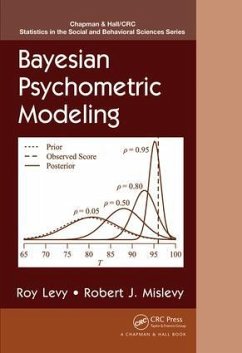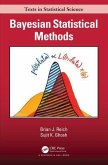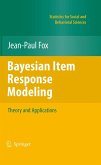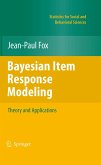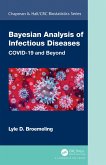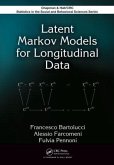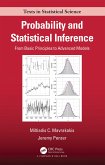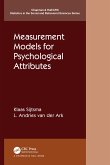A Single Cohesive Framework of Tools and Procedures for Psychometrics and Assessment Bayesian Psychometric Modeling presents a unified Bayesian approach across traditionally separate families of psychometric models. It shows that Bayesian techniques, as alternatives to conventional approaches, offer distinct and profound advantages in achieving many goals of psychometrics. Adopting a Bayesian approach can aid in unifying seemingly disparate-and sometimes conflicting-ideas and activities in psychometrics. This book explains both how to perform psychometrics using Bayesian methods and why many of the activities in psychometrics align with Bayesian thinking. The first part of the book introduces foundational principles and statistical models, including conceptual issues, normal distribution models, Markov chain Monte Carlo estimation, and regression. Focusing more directly on psychometrics, the second part covers popular psychometric models, including classical test theory, factor analysis, item response theory, latent class analysis, and Bayesian networks. Throughout the book, procedures are illustrated using examples primarily from educational assessments. A supplementary website provides the datasets, WinBUGS code, R code, and Netica files used in the examples.
"One true asset of this book is the impeccable organization. The topics build upon one another nicely, with the most basic of models (i.e., the true score model) presented first. The flow of the chapters was well designed, with model complexity increasing steadily through the topics. The authors introduced latent variable modeling using continuous latent variables (e.g., confirmatory factor analysis and item response theory). Then, they extended this idea into the incorporation of categorical latent variables (e.g., latent class modeling and Bayes networks). Within each chapter, the most common priors were presented and described for each model. The description and illustration of implementing priors for continuous and categorical latent variable models were done particularly well...The authors successfully incorporated examples throughout the entire text. These examples were quite detailed and included everything from model specification, annotated software syntax, diagnostics, results, and interpretation. Many examples use publicly available data. Not only does this feature make replication possible for the results, but it is also an added benefit for students using this as a course textbook. One could easily walk through the steps in this book and conduct analyses from all of the model-based chapters included...Given the strong emphasis on examples and detailed descriptions throughout the book, we highly recommend this as a textbook for graduate-level courses on Bayesian statistics or psychometrics. The authors effectively balanced the content regarding general Bayesian inference and specific psychometric models. Therefore, the book can be used as either the main text for a standalone course on Bayesian psychometrics or as supplementary reading for a course focusing on a particular model (e.g., factor analysis)."
-Sarah Depaoli and Yang Liu in Psychometrika, June 2018
"This book is a great contribution to the field of Bayesian psychometrics. It
-Sarah Depaoli and Yang Liu in Psychometrika, June 2018
"This book is a great contribution to the field of Bayesian psychometrics. It

